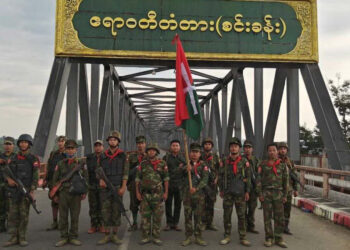MANDALAY—The death toll from the seasonal H1N1 influenza virus has inched closer towards 100, the Ministry of Health and Sports announced on Tuesday.
The announcement, which covered deaths nationwide, stated that a total of 81 have died from the H1N1 influenza virus between January 1 and July 29.
Yangon saw the most fatalities, with 62, followed by the Irrawaddy and Pegu regions, which recorded five death each, and Mon State, which recorded three.
The ministry said that, of 995 suspected cases (nationwide?), laboratory tests returned 417 confirmed H1N1 diagnoses.
Deputy Director of the Ministry of Health and Sports Daw Khin Khin Gyi told The Irrawaddy that 16 of the 81 deaths were the direct result of the H1N1 virus while the rest were the result of complications arising from chronic health problems such as cancer, diabetes, chronic heart disease and hypertension.
“Sixty-five people [that died] had chronic health problems that created complications once they were infected with the virus. Their cause of death was not solely the flu,” she said. “However, we can say that the other 16 people died solely because of the H1N1 virus.”
The deputy director also said that those 16 people were comprised of young children, the elderly and people that visited hospitals very late in the course of their infection.
According to the ministry, health workers have the situation under control and the number of H1N1 diagnoses is declining.
“We faced such a situation in 2017 with many fatalities, so we’ve been well prepared since early February for the flu season. Now the number of the people diagnosed with the virus is declining dramatically and we are giving proper treatment to affected people,” Daw Khin Khin Gyi said.
The ministry said they’d distributed pamphlets with do’s and don’ts for infection prevention to the most-impacted regions, especially Yangon, and addition educational programs are ongoing on broadcast and state-owned media.
“We are now able to control the situation. However, people also need to follow healthy procedures to prevent themselves from being infected. If sick, people should see their doctor immediately, because they may need to be admitted to the hospital for proper treatment,” Daw Khin Khin Gyi said.
In 2017 there were 1,165 suspected cases and 406 people diagnosed with H1N1. Nationwide, 38 of those diagnosed died. That year, the Taung Pyone Nats and Sprits Festival in Mandalay—which thousands of devotees had planned to attend—was ordered suspended because of the outbreak.
There were no fatalities last year, when only 13 cases were confirmed, according to the Ministry of Health and Sports.
You May Also Like These Stories:
41 H1N1-Related Deaths Recorded Nationwide
H1N1 Death Toll Reaches 26 Nationwide
















